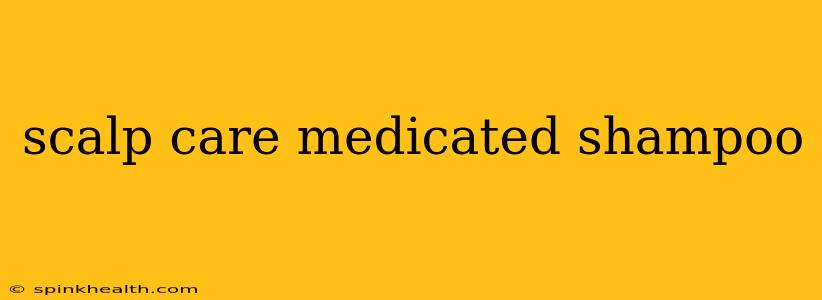Let's be honest, a healthy scalp is the foundation of healthy hair. But sometimes, our scalps need a little extra help. That's where medicated shampoos come in. They're not just for dandruff anymore; they tackle a range of scalp issues, from itching and irritation to more serious conditions. This journey through the world of medicated shampoos will uncover their power and guide you to choosing the right one for your needs.
Imagine this: You're running your fingers through your hair, and instead of feeling smooth strands, you encounter flakes, itching, or even redness. It's frustrating, uncomfortable, and can even impact your confidence. But before you reach for just any shampoo, understanding the different types of medicated shampoos and their active ingredients is key.
What are Medicated Shampoos?
Medicated shampoos contain active ingredients designed to treat specific scalp conditions. Unlike regular shampoos that primarily cleanse, medicated shampoos work to address the root cause of the problem. Think of them as targeted scalp treatments disguised as shampoos.
What are the Different Types of Medicated Shampoos?
The world of medicated shampoos is surprisingly diverse. Let's explore some common types and their applications:
H2: Dandruff Shampoos:
Dandruff, characterized by visible flakes and sometimes itching, is perhaps the most common reason people reach for medicated shampoos. These shampoos typically contain ingredients like:
- Selenium sulfide: This ingredient slows down the growth of yeast that contributes to dandruff.
- Pyrithione zinc: This antifungal agent combats yeast and bacteria, reducing flakes and itching.
- Ketoconazole: A powerful antifungal, ketoconazole is effective against stubborn dandruff and seborrheic dermatitis.
- Salicylic acid: This ingredient helps to loosen and remove dead skin cells, reducing flakes.
Choosing the right dandruff shampoo depends on the severity of your dandruff. Mild cases might respond well to over-the-counter options, while more persistent cases may require a prescription-strength shampoo.
H2: Shampoos for Seborrheic Dermatitis:
Seborrheic dermatitis is a more severe form of dandruff, often characterized by red, inflamed patches, greasy scales, and intense itching. Medicated shampoos for seborrheic dermatitis often contain the same active ingredients as dandruff shampoos, but at higher concentrations. Ketoconazole and coal tar shampoos are particularly effective.
H2: Shampoos for Psoriasis:
Psoriasis is a chronic autoimmune disease that causes rapid skin cell growth, resulting in thick, scaly patches. Shampoos containing coal tar or salicylic acid can help to remove scales and reduce inflammation. However, it's crucial to consult a dermatologist for psoriasis management, as shampoos alone may not be sufficient.
H2: Shampoos for Eczema:
Eczema, a condition causing dry, itchy skin, can also affect the scalp. Gentle, moisturizing shampoos, possibly containing ingredients like ceramides or colloidal oatmeal, can help soothe irritation. However, for severe eczema, a dermatologist's guidance is vital.
H2: How Often Should I Use a Medicated Shampoo?
The frequency of use depends on the specific shampoo and the condition being treated. Some shampoos are intended for daily use, while others are recommended for just once or twice a week. Always follow the instructions on the product label. Overuse can sometimes lead to dryness or irritation.
H2: Can I Use a Medicated Shampoo Every Day?
While some medicated shampoos are safe for daily use, many are not. Overuse can strip your scalp of its natural oils, leading to dryness, irritation, and even worsening of the condition you’re trying to treat. Always check the product instructions and consult a dermatologist if you're unsure.
H2: Are Medicated Shampoos Safe for All Hair Types?
Medicated shampoos can sometimes dry out hair, especially if used too frequently. Individuals with already dry or damaged hair may need to use a moisturizing conditioner after washing with a medicated shampoo. Again, following product instructions and considering your hair type is crucial.
The Takeaway:
Medicated shampoos are powerful tools in the fight for a healthy scalp. But choosing the right one and using it correctly is essential. If your scalp condition persists or worsens, always seek professional advice from a dermatologist or doctor. They can diagnose the underlying cause and recommend the most effective treatment plan, which may involve medicated shampoos as part of a broader approach to scalp health. Remember, a healthy scalp is the key to beautiful, vibrant hair.

